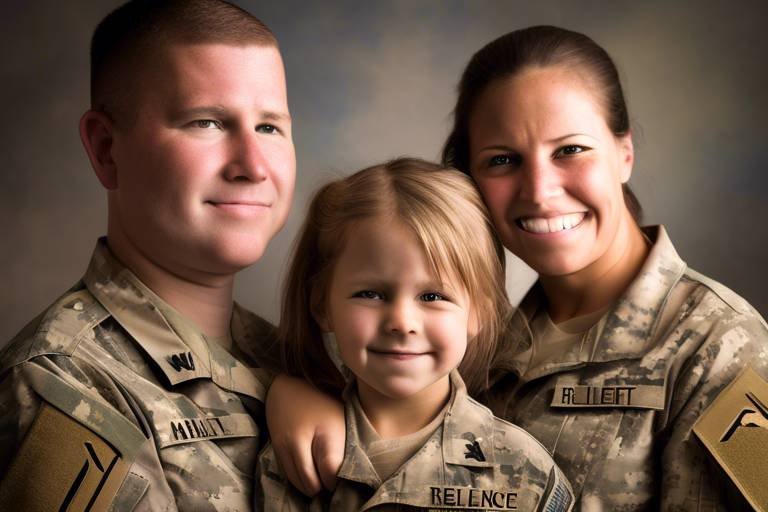The Impact of Resilience on Military Families
Military families live in a world where change is the only constant. From frequent relocations to the emotional rollercoaster of deployments, their lives are often marked by unique challenges that demand a high level of resilience. Resilience is not just a buzzword; it’s a vital skill that can make the difference between thriving and merely surviving in the face of adversity. Imagine resilience as a sturdy bridge that helps families cross the turbulent waters of military life. It allows them to adapt, recover, and grow stronger together, even when the going gets tough.
But what exactly does resilience mean for military families? It encompasses the ability to bounce back from stress, maintain emotional well-being, and support one another during difficult times. Think of it as an emotional toolbox filled with skills and strategies that families can draw upon when challenges arise. The benefits of fostering resilience are immense, leading to healthier relationships, better mental health, and a more profound sense of community among military families.
However, the road to resilience isn't always smooth. Military families face a myriad of challenges that can put their resilience to the test. Frequent moves can disrupt routines and friendships, while deployments can lead to feelings of isolation and anxiety. These pressures can strain relationships and impact mental health, making it essential for families to develop strong resilience skills. It’s like being in a high-stakes game where the rules keep changing, and the players must adapt quickly to stay in the game.
In the following sections, we will dive deeper into the importance of resilience, the challenges military families face, and practical strategies to build resilience. We'll explore how effective communication, strong support networks, and mindful practices can empower families to navigate the complexities of military life. So, buckle up as we embark on this journey to understand the profound impact of resilience on military families!
Resilience plays a crucial role in helping military families adapt to the challenges of service life, enhancing their ability to cope with stress and maintain emotional well-being during difficult times. It acts as a buffer against the inevitable stressors that come with military life, allowing families to face challenges with greater confidence and optimism. When families are resilient, they are better equipped to handle the ups and downs of military life, leading to a more fulfilling and connected family experience.
Military families encounter numerous challenges, including frequent relocations, deployment stress, and separation, which can strain relationships and mental health. Each of these challenges presents unique hurdles that require resilience to navigate effectively. For instance, frequent moves can disrupt children's education and friendships, while the emotional toll of deployment can lead to feelings of loneliness and anxiety.
The emotional toll of deployment and separation can be significant for military families. During these times, family members often grapple with feelings of loneliness, anxiety, and uncertainty. The absence of a loved one can create a void that is hard to fill, highlighting the need for resilience-building strategies. It’s essential to recognize that these feelings are normal and that developing coping mechanisms can help families manage the emotional fallout.
Effective communication is vital for maintaining connections during deployments. Families can benefit from learning techniques to enhance communication, fostering emotional support and understanding despite physical distance. Regular video calls, text messages, and even handwritten letters can help bridge the gap, allowing family members to share their experiences and feelings.
Building strong support networks within the community and among other military families can help individuals cope with the challenges of separation. These networks provide a sense of belonging and shared experience, which can be incredibly comforting. Engaging with other families who understand the unique pressures of military life can create a supportive environment where everyone feels less alone.
Children in military families face unique pressures, such as adjusting to new schools and dealing with parental absence. These challenges can be daunting, making resilience essential for their emotional and social development during these transitions. It’s crucial for parents to model resilience for their children, demonstrating how to cope with change and adversity in healthy ways.
Developing resilience involves adopting specific strategies and practices that empower military families to thrive despite their unique challenges. It’s about creating a toolkit of skills that can be accessed when times get tough. By focusing on mindfulness, family bonding, and support networks, military families can enhance their resilience and foster a nurturing environment.
Practicing mindfulness and stress management techniques can help military families reduce anxiety and enhance emotional regulation. Mindfulness encourages individuals to stay present and focused, allowing them to face challenges with confidence. Techniques such as meditation, deep breathing exercises, and yoga can be beneficial for promoting a resilient mindset.
Engaging in family activities and bonding experiences can strengthen relationships and promote resilience. Whether it's game nights, outdoor adventures, or simply cooking together, these moments create a supportive environment where family members can share their feelings and cope with challenges together. It’s these shared experiences that help build a strong foundation of resilience within the family unit.
- What is resilience in the context of military families? Resilience refers to the ability of military families to adapt and thrive despite the unique challenges they face, such as deployments and frequent relocations.
- How can military families build resilience? Families can build resilience through effective communication, developing support networks, practicing mindfulness, and engaging in bonding activities.
- Why is resilience important for children in military families? Resilience helps children cope with the stress of adjusting to new environments and dealing with parental absence, promoting their emotional and social development.

The Importance of Resilience
This article explores how resilience affects military families, examining its benefits, challenges, and strategies for fostering resilience in the face of unique pressures associated with military life.
Resilience plays a crucial role in helping military families adapt to the challenges of service life. Imagine being a soldier deployed thousands of miles away from home, while your loved ones are left to navigate daily life without your presence. The ability to bounce back from such difficulties is not just a skill; it’s a lifeline. Resilience enhances the family’s ability to cope with stress and maintain emotional well-being during difficult times, acting as a buffer against the inevitable strains that military life imposes.
For military families, resilience means more than just enduring hardship; it is about thriving despite it. When families cultivate resilience, they develop a toolkit of strategies that can help them face various challenges head-on. This includes everything from managing the emotional rollercoaster of deployment to finding ways to stay connected across distances. The importance of resilience can be summed up in a few key benefits:
- Enhanced Coping Mechanisms: Families with high resilience can better manage stress and anxiety, leading to healthier emotional responses.
- Stronger Relationships: Resilience fosters better communication and understanding among family members, which is vital during times of separation.
- Improved Mental Health: Resilient families are less likely to experience severe mental health issues, as they have the tools to navigate their emotions effectively.
Furthermore, resilience is not a fixed trait; it can be developed and strengthened over time. Military families can engage in various practices that promote resilience, such as participating in community support groups or engaging in open conversations about their feelings and experiences. These practices not only help individuals cope with the challenges of military life but also empower the entire family unit to face adversity together.
In essence, the importance of resilience in military families cannot be overstated. It is the glue that holds them together during turbulent times, allowing them to adapt, grow, and flourish despite the unique pressures they face. By nurturing resilience, military families can transform challenges into opportunities for growth, ensuring that they emerge stronger and more united than ever before.
Military families encounter numerous challenges, including frequent relocations, deployment stress, and separation, which can strain relationships and mental health, necessitating strong resilience to navigate these obstacles effectively.
The emotional toll of deployment and separation can be significant for military families, often leading to feelings of loneliness and anxiety, highlighting the need for resilience-building strategies to support them during these times.
Effective communication is vital for maintaining connections during deployments. Families can benefit from learning techniques to enhance communication, fostering emotional support and understanding despite physical distance.
Building strong support networks within the community and among other military families can help individuals cope with the challenges of separation, providing a sense of belonging and shared experience.
Children in military families face unique pressures, such as adjusting to new schools and dealing with parental absence, making resilience essential for their emotional and social development during these transitions.
Developing resilience involves adopting specific strategies and practices that empower military families to thrive despite their unique challenges, ensuring they can cope effectively with stress and adversity.
Practicing mindfulness and stress management techniques can help military families reduce anxiety and enhance emotional regulation, fostering a resilient mindset that enables them to face challenges with confidence.
Engaging in family activities and bonding experiences can strengthen relationships and promote resilience, creating a supportive environment where family members can share their feelings and cope with challenges together.
Q1: What is resilience, and why is it important for military families?
A1: Resilience is the ability to adapt and bounce back from adversity. For military families, it is crucial because it helps them cope with the unique challenges of military life, such as deployments and relocations.
Q2: How can military families build resilience?
A2: Military families can build resilience by engaging in open communication, participating in community support programs, practicing mindfulness, and spending quality time together.
Q3: What are some common challenges faced by military families?
A3: Common challenges include frequent relocations, deployment stress, separation anxiety, and the emotional toll of adjusting to changes in family dynamics.
Q4: How does resilience impact children in military families?
A4: Resilience helps children in military families navigate the challenges of moving and parental absence, promoting their emotional and social development during transitions.

Challenges Faced by Military Families
Military families face a unique set of challenges that can significantly impact their daily lives and overall well-being. These challenges stem from the nature of military service, which often involves frequent relocations, deployment stress, and prolonged periods of separation. Each of these factors can strain relationships and mental health, making resilience an essential trait for navigating the ups and downs of military life.
One of the most daunting challenges is the frequent relocations that military families endure. Moving every few years means that children must adjust to new schools, make new friends, and adapt to different environments. This constant change can be overwhelming and may lead to feelings of instability and anxiety. For parents, the pressure to provide a sense of normalcy amidst these transitions can be immense. They often find themselves juggling the logistics of moving while trying to support their children emotionally.
Another significant hurdle is the emotional toll of deployment and separation. When a service member is deployed, families often experience a profound sense of loss and uncertainty. The absence of a parent can lead to feelings of loneliness and anxiety, particularly for children who may struggle to understand why their parent is away. This emotional strain can lead to behavioral issues and decreased academic performance, further complicating the family's ability to cope.
Moreover, the pressure of maintaining relationships during these periods of separation cannot be understated. Communication often becomes strained, as families must rely on technology to stay connected. While video calls and messaging apps can help bridge the gap, they cannot fully replicate the comfort of in-person interactions. As a result, many military families find themselves feeling isolated and unsupported.
To illustrate the challenges faced by military families, consider the following table that outlines some of the most common issues:
| Challenge | Description |
|---|---|
| Frequent Relocations | Moving often disrupts children's education and social connections. |
| Deployment Stress | Separation can lead to emotional distress and anxiety for all family members. |
| Communication Barriers | Relying on technology can lead to feelings of isolation. |
In addition to these challenges, military families must also contend with the potential for mental health issues arising from the unique pressures of military life. Studies have shown that service members and their families are at a higher risk for conditions such as depression and anxiety. The stigma surrounding mental health can further complicate matters, as families may feel reluctant to seek help or discuss their struggles.
Ultimately, the challenges faced by military families are significant but not insurmountable. With the right support systems and resilience-building strategies in place, these families can navigate the complexities of military life and emerge stronger together.
- What are some common challenges military families face during deployments?
Common challenges include emotional distress due to separation, communication difficulties, and the impact on children's education and social lives. - How can military families build resilience?
Families can build resilience through effective communication, establishing support networks, and engaging in family bonding activities. - What resources are available for military families?
There are numerous resources available, including military support organizations, counseling services, and community groups focused on helping military families cope with the unique challenges they face.

Deployment and Separation
The emotional toll of deployment and separation on military families is often profound and multifaceted. Imagine being a parent, only to find yourself navigating the choppy waters of loneliness and anxiety while your partner is thousands of miles away. It’s a scenario that many military families face, and it can lead to feelings of isolation and uncertainty. The absence of a loved one can create a void that is hard to fill, affecting not just the spouse left behind but also the children who must adjust to a new normal.
During deployment, the family unit often undergoes significant changes. Responsibilities may shift, with one parent taking on the role of both caregiver and provider. This can lead to increased stress, as individuals must juggle multiple roles while coping with the emotional weight of separation. The reality is that military families need to develop strong resilience to manage these challenges effectively. Resilience acts as a buffer, enabling families to withstand the pressures of deployment and emerge stronger on the other side.
Communication becomes a lifeline during these times. Families must find ways to stay connected despite the physical distance. Techniques such as video calls, regular emails, and even handwritten letters can help bridge the gap, allowing family members to share their experiences and emotions. Effective communication not only fosters emotional support but also strengthens the bond between family members, reminding them that they are not alone in this journey.
Moreover, the importance of establishing a solid support network cannot be overstated. Military families can benefit from connecting with others who understand their unique challenges. This sense of community can provide a shared experience that alleviates feelings of isolation. Whether it’s through local support groups, online forums, or neighborhood gatherings, having a network of people to lean on can make a world of difference during times of separation.
In summary, deployment and separation present significant challenges for military families, but with the right strategies in place, they can navigate these turbulent waters. By focusing on effective communication and building strong support networks, families can foster resilience that not only helps them cope with the immediate stresses but also prepares them for future challenges.
- How can military families cope with deployment?
Military families can cope with deployment by maintaining open lines of communication, establishing routines, and seeking support from community resources.
- What are some effective communication strategies during deployment?
Effective strategies include scheduling regular video calls, using messaging apps for daily check-ins, and encouraging family members to share their feelings openly.
- How can children in military families be supported during a parent's deployment?
Supporting children can involve creating stability through routines, encouraging them to express their feelings, and connecting them with peers who understand their situation.

Communication Strategies
Effective communication is the lifeblood of any relationship, but for military families, it takes on an even more critical role. When a loved one is deployed, the physical distance can create an emotional chasm that, if left unaddressed, can lead to misunderstandings and feelings of isolation. To bridge this gap, families can employ several communication strategies that foster connection and understanding, even when miles apart.
One of the most effective methods is to establish a consistent communication schedule. Just like setting a date for a family dinner, scheduling regular check-ins can provide a sense of stability. Whether through video calls, phone conversations, or even handwritten letters, having a routine can help everyone feel more connected. For example, families might decide to have a video call every Sunday evening, creating a cherished tradition that everyone looks forward to. This predictable rhythm can help alleviate anxiety and make the separation feel more manageable.
In addition to scheduling, active listening is paramount. It’s not just about talking; it’s about truly hearing what each family member has to say. When communicating, especially during tough conversations, it’s essential to listen without interruption and respond thoughtfully. This practice fosters an environment where everyone feels valued and understood. For instance, if a child expresses feelings of loneliness, acknowledging those feelings and discussing them openly can help mitigate the emotional toll of separation.
Moreover, utilizing technology can enhance communication. With a plethora of apps and platforms available, military families can take advantage of tools like video messaging, group chats, and even social media to stay connected. However, it’s crucial to choose the right platforms that suit the family’s needs. For example, using a private group chat can allow family members to share daily updates, photos, and support each other in real time, keeping everyone involved in each other's lives despite the distance.
Lastly, fostering an atmosphere of emotional openness can significantly improve communication. Encouraging family members to share their feelings, fears, and joys can create a supportive environment where everyone feels comfortable expressing themselves. This openness not only strengthens the bond between family members but also equips them to handle the emotional ups and downs that come with military life. By normalizing discussions about feelings, families can prepare for the inevitable challenges that arise during deployments and separations.
In conclusion, effective communication strategies are essential for military families navigating the unique challenges of separation. By establishing a consistent schedule, practicing active listening, utilizing technology, and fostering emotional openness, families can maintain strong connections that withstand the test of time and distance. These strategies not only enhance relationships but also contribute to building resilience, enabling families to face the challenges of military life together.
- What are some effective ways to stay connected during deployment? Regular video calls, using messaging apps, and writing letters can help maintain connection.
- How can families manage feelings of loneliness during separation? Establishing routines and encouraging open discussions about feelings can help alleviate loneliness.
- What role does technology play in communication for military families? Technology provides various platforms for staying in touch, which can enhance communication and emotional support.
- Why is active listening important in military families? Active listening fosters understanding and validation, making family members feel valued and heard.

Support Networks
Building a strong support network is absolutely essential for military families navigating the unique challenges of service life. These networks can be likened to a safety net, providing emotional support, practical assistance, and a sense of belonging that can make all the difference during tough times. When a service member is deployed, the absence can create a void that may lead to feelings of isolation. However, with a robust support system in place, families can find comfort and strength in shared experiences.
Support networks can take many forms, including family, friends, neighbors, and community organizations. Here are some key components of effective support networks:
- Community Groups: Many military installations offer community programs specifically designed for military families. These groups often host events, workshops, and social gatherings that foster connections among families facing similar challenges.
- Online Communities: In today’s digital age, online platforms provide a space for military families to connect, share experiences, and offer advice. Social media groups and forums can be invaluable resources for finding support and encouragement.
- Peer Support: Connecting with other military families can help create a sense of camaraderie. Families can share coping strategies, celebrate successes, and provide emotional support during difficult times.
Moreover, the importance of communication within these networks cannot be overstated. Regular check-ins, whether through phone calls, video chats, or in-person visits, can help maintain strong ties. Just like a well-tended garden, these relationships need nurturing to grow. When families actively engage with their support networks, they cultivate a sense of community that can help alleviate feelings of loneliness and anxiety.
Additionally, local organizations often provide resources such as counseling services, educational workshops, and recreational activities. These resources not only promote resilience but also empower families to take proactive steps in managing stress. By participating in community events and utilizing available resources, military families can create a supportive environment that fosters emotional well-being.
In conclusion, support networks are a lifeline for military families. They not only help mitigate the emotional challenges of military life but also enhance the overall quality of life. By investing time and effort into building and maintaining these connections, families can navigate the ups and downs of military service with greater resilience and strength.
- What are some ways to build a support network as a military family?
Joining local community groups, participating in military family events, and connecting with other families online are great ways to build a support network.
- How can I maintain connections during deployments?
Regular communication through calls, texts, and video chats can help maintain connections. Planning virtual family activities can also strengthen bonds.
- What resources are available for military families?
Many military installations offer resources such as counseling, workshops, and recreational activities designed specifically for military families.

Impact on Children
The impact of military life on children is profound and multifaceted. Children in military families often face a unique set of challenges that can shape their emotional and social development. For starters, frequent relocations can disrupt their education and friendships, leaving them feeling isolated and uncertain. Imagine being uprooted from your home, leaving behind friends, and having to start over in a new school—it's like being a leaf blown around in the wind, searching for a place to settle.
Moreover, the absence of a parent due to deployment can create a significant emotional void. Children may experience feelings of loneliness, anxiety, and even anger. They often struggle to understand why their parent is away and when they will return, leading to a rollercoaster of emotions. This situation underscores the importance of resilience; it acts as a safety net, helping children to bounce back from these emotional challenges.
To navigate these turbulent waters, military children can benefit from various strategies that foster resilience. Here are some key aspects that can help:
- Open Communication: Encouraging children to express their feelings about deployment and relocations can help them process their emotions. Parents can create a safe space where children feel comfortable sharing their thoughts.
- Routine and Stability: Establishing routines can provide a sense of normalcy amidst the chaos. This stability can be incredibly comforting for children, helping them to feel more secure.
- Peer Support: Connecting with other military families can reduce feelings of isolation. Children can share their experiences with peers who understand their unique challenges, fostering a sense of belonging.
Additionally, parents can play a crucial role in modeling resilience. By demonstrating how to cope with stress and adapt to change, they set a powerful example for their children. It's like teaching them to ride a bike; they may wobble and fall at first, but with practice and encouragement, they learn to balance and ride confidently.
The emotional well-being of military children is not just about surviving the challenges of military life; it's about thriving despite them. By fostering resilience, military families can equip their children with the tools they need to navigate life's ups and downs, ensuring they grow into well-adjusted, confident adults.
- What are some common challenges faced by military children? Military children often deal with frequent relocations, parental absence due to deployment, and the need to adjust to new schools and communities.
- How can parents help their children cope with deployment? Open communication, maintaining routines, and encouraging connections with other military families can help children cope with the emotional challenges of deployment.
- What role does resilience play in a child's development? Resilience helps children adapt to stress and adversity, allowing them to bounce back from challenges and develop emotional strength and stability.

Building Resilience in Military Families
Building resilience in military families is not just a nice-to-have; it’s a necessity that enables them to thrive amid the unique challenges they face. The military lifestyle, characterized by frequent moves, deployments, and the inherent uncertainties of service life, can be overwhelming. However, by adopting specific strategies and practices, families can cultivate resilience that empowers them to cope effectively with stress and adversity.
One of the most effective ways to foster resilience is through mindfulness and stress management techniques. These practices encourage family members to be present in the moment and to manage their emotions more effectively. For instance, simple mindfulness exercises, such as deep breathing or meditation, can help reduce anxiety and improve emotional regulation. When families practice these techniques together, they not only enhance their individual well-being but also strengthen their bonds as they support each other in navigating life’s ups and downs.
Additionally, engaging in family activities and bonding experiences is crucial. Whether it’s a game night, outdoor adventures, or even cooking meals together, these shared experiences create a supportive environment where family members can express their feelings and cope with challenges as a unit. Such activities not only foster emotional connections but also provide a safe space for discussions about the stresses related to military life. In this way, families can build a reservoir of strength that they can draw upon during tough times.
Moreover, establishing routines can significantly enhance resilience. Routines provide a sense of normalcy and predictability, which can be particularly comforting during periods of change. For military families, having a daily schedule that includes time for work, play, and relaxation can help create a balanced life, even amidst the chaos of deployments and relocations. This structure allows family members to feel more secure and connected, reinforcing their ability to face challenges together.
Lastly, it’s essential to recognize the importance of support networks. Connecting with other military families can create a sense of community and shared experience. These networks can be formed through local organizations, online forums, or support groups, providing a platform for families to share their experiences, challenges, and coping strategies. When families know they are not alone in their struggles, it fosters resilience and encourages them to reach out for help when needed.
In conclusion, building resilience in military families is a multifaceted approach that involves mindfulness, bonding activities, establishing routines, and creating support networks. By implementing these strategies, military families can not only survive but thrive, turning challenges into opportunities for growth and connection.
- What is resilience, and why is it important for military families?
Resilience is the ability to bounce back from challenges and adapt positively to stress. For military families, resilience is crucial as it helps them cope with the unique pressures of military life, such as deployments and frequent relocations. - How can mindfulness practices help military families?
Mindfulness practices can help reduce anxiety and improve emotional regulation, allowing family members to manage stress more effectively and support each other during tough times. - What types of family activities can promote bonding and resilience?
Engaging in activities like game nights, outdoor adventures, or cooking together can strengthen family bonds and provide a supportive environment for discussing challenges. - How can military families establish support networks?
Military families can connect with others through local organizations, online forums, or support groups, creating a community where they can share experiences and coping strategies.

Mindfulness and Stress Management
In the whirlwind of military life, where unpredictability reigns and stressors seem to multiply, mindfulness and stress management emerge as powerful allies for military families. Imagine standing in the eye of a storm—calm, centered, and focused. That’s the essence of mindfulness. By cultivating this state of awareness, families can navigate the turbulent waters of military life with greater ease and resilience.
Mindfulness is not just about meditation; it’s a way of approaching life. It encourages individuals to be present in the moment, acknowledging their thoughts and feelings without judgment. This practice can significantly reduce anxiety and promote emotional regulation. For military families, who often face unique challenges such as deployment, relocation, and the stress of daily life, integrating mindfulness into their routine can be a game changer.
To incorporate mindfulness effectively, families can engage in various activities that promote a sense of peace and connection. Here are some practical strategies:
- Mindful Breathing: Taking a few minutes each day to focus on your breath can ground you, helping to alleviate feelings of stress and anxiety.
- Gratitude Journaling: Writing down things you are grateful for can shift your focus from stressors to positive aspects of life, promoting a more optimistic outlook.
- Nature Walks: Spending time outdoors, whether it’s a stroll in the park or a hike in the woods, can rejuvenate the mind and body, fostering a sense of calm.
Moreover, stress management techniques can complement mindfulness practices. These techniques involve recognizing stress triggers and developing coping mechanisms to handle them effectively. For instance, families can create a stress management plan that includes:
| Stress Trigger | Coping Strategy |
|---|---|
| Deployment Anxiety | Engage in regular family video calls to maintain connection. |
| Relocation Stress | Research the new area together and plan fun outings to explore. |
| Child’s Adjustment Issues | Establish a routine to provide stability and familiarity. |
By developing a toolkit of mindfulness practices and stress management strategies, military families can enhance their resilience. The journey may not always be easy, but with a mindful approach, families can transform challenges into opportunities for growth and connection.
Q: How can mindfulness help my family during deployments?
A: Mindfulness can help family members stay grounded and connected, reducing feelings of anxiety and loneliness through practices like mindful breathing and regular communication.
Q: What are some quick mindfulness techniques we can practice together?
A: Techniques such as mindful breathing, gratitude journaling, and nature walks can be practiced together, promoting family bonding while enhancing emotional well-being.
Q: How do I know if my stress management plan is effective?
A: Monitor how you and your family feel over time. If you notice reduced anxiety and improved emotional regulation, your plan is likely working. Don't hesitate to adjust strategies as needed.

Family Activities and Bonding
Family activities and bonding are not just fun; they are essential for nurturing resilience in military families. When a service member is deployed, family members can often feel isolated and disconnected. Engaging in shared activities helps to bridge that gap, creating lasting memories and strengthening emotional ties. Think of it like glue; the more you engage in these activities, the stronger your family bond becomes. Whether it’s a simple game night, a weekend hike, or a family movie marathon, these moments allow families to connect and communicate, which is vital during times of separation.
One effective way to foster bonding is through regular family traditions. These can be as simple as a Sunday dinner or a monthly outing. The predictability of these events provides a sense of stability and security, especially for children. For instance, if every Sunday is dedicated to a family game night, it not only gives everyone something to look forward to but also becomes a cherished tradition that reinforces family identity.
Moreover, participating in community events can also enhance bonding. Many military bases offer family-friendly activities, from picnics to sports tournaments. Engaging in these events helps families connect with others in similar situations, reducing feelings of isolation. It’s like finding a new family within a community that understands your unique challenges. This shared experience can be incredibly comforting.
Another key aspect of family bonding is open communication. During activities, families should encourage each other to share their feelings and experiences. This open dialogue can help children articulate their emotions regarding a parent's deployment or the stressors of military life. For example, after a family hike, discussing what everyone found challenging or enjoyable can provide insights into each family member's emotional state. This practice not only fosters understanding but also builds emotional resilience.
In addition to these activities, it’s crucial to incorporate mindfulness practices into family routines. This could be as simple as a few minutes of meditation or yoga together. These practices help everyone to remain grounded and present, promoting emotional well-being. When families take time to breathe and reflect together, it cultivates a supportive environment where each member feels valued and understood.
Ultimately, the goal of these family activities is to create a safe space where everyone feels comfortable expressing themselves. By prioritizing bonding time, military families can cultivate resilience, ensuring they are better equipped to handle the stresses that come with military life. So, whether it’s through shared hobbies, traditions, or community involvement, the key is to stay connected and engaged. Remember, the strength of a family lies in its unity, especially during challenging times.
- What are some effective family activities for military families?
Some effective activities include game nights, outdoor adventures, and community events. These activities help strengthen bonds and create lasting memories.
- How can communication improve family resilience?
Open communication allows family members to express their feelings and experiences, fostering understanding and emotional support, which is vital during stressful times.
- Why are traditions important for military families?
Traditions provide stability and a sense of belonging, helping family members feel connected despite the challenges of military life.
- What role does mindfulness play in family bonding?
Mindfulness practices help families stay grounded and present, promoting emotional well-being and enhancing the overall family dynamic.
Frequently Asked Questions
- What is resilience and why is it important for military families?
Resilience is the ability to adapt and bounce back from adversity. For military families, it’s crucial because they face unique challenges like frequent relocations and deployment stress. Resilience helps them cope with these pressures, maintain emotional well-being, and strengthen their relationships.
- How do deployments affect military families emotionally?
Deployments can lead to significant emotional strain, including feelings of loneliness, anxiety, and uncertainty. The separation can disrupt family dynamics and create challenges in maintaining connections, making resilience-building strategies essential for navigating these tough times.
- What communication strategies can help during deployments?
Effective communication is key during deployments. Families can benefit from setting regular times to talk, using video calls, and sharing daily experiences. These practices foster emotional support and understanding, helping families feel connected despite the distance.
- How can support networks benefit military families?
Building strong support networks can provide military families with a sense of belonging and shared experiences. Connecting with other military families and community resources can help individuals cope with challenges, offering emotional support and practical assistance during tough times.
- What are some strategies for building resilience in children of military families?
To help children develop resilience, parents can encourage open conversations about feelings, establish routines, and involve them in family activities. Engaging in community programs and activities can also help children adjust to new environments and cope with parental absence more effectively.
- What role does mindfulness play in fostering resilience?
Mindfulness practices, such as meditation and deep breathing, can significantly reduce anxiety and enhance emotional regulation. By promoting a resilient mindset, these techniques help military families face challenges with confidence and maintain a positive outlook during difficult times.
- How can family activities strengthen resilience?
Engaging in family activities, like game nights or outdoor adventures, can strengthen relationships and create a supportive environment. These bonding experiences allow family members to share their feelings and cope with challenges together, ultimately fostering resilience.



















